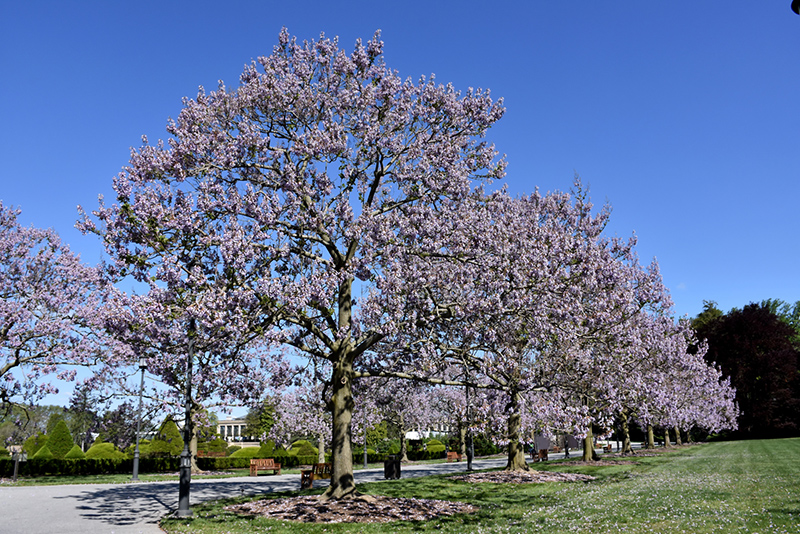Height: 40 feet
Spread: 30 feet
Sunlight:
![]()
![]()
Hardiness Zone: 6a
Other Names: Princess Tree
Description:
A real beauty in bloom, this showcase tree features bold panicles of lavender flowers before the leaves emerge; a tall, dense tree with large, coarse leaves, excellent as a shade tree for larger yards; leaves and fruit can be somewhat untidy in fall
Ornamental Features
Royal Empress Tree is draped in stunning panicles of fragrant violet orchid-like flowers with purple throats and yellow stripes rising above the foliage in mid spring before the leaves. It has green deciduous foliage. The enormous heart-shaped leaves do not develop any appreciable fall color. However, the fruit can be messy in the landscape and may require occasional clean-up.
Landscape Attributes
Royal Empress Tree is a deciduous tree with a more or less rounded form. Its strikingly bold and coarse texture can be very effective in a balanced landscape composition.
This is a high maintenance tree that will require regular care and upkeep, and should only be pruned after flowering to avoid removing any of the current season's flowers. It is a good choice for attracting hummingbirds to your yard. Gardeners should be aware of the following characteristic(s) that may warrant special consideration;
- Messy
Royal Empress Tree is recommended for the following landscape applications;
- Accent
- Shade
Planting & Growing
Royal Empress Tree will grow to be about 40 feet tall at maturity, with a spread of 30 feet. It has a high canopy with a typical clearance of 7 feet from the ground, and should not be planted underneath power lines. As it matures, the lower branches of this tree can be strategically removed to create a high enough canopy to support unobstructed human traffic underneath. It grows at a fast rate, and under ideal conditions can be expected to live for 80 years or more.
This tree does best in full sun to partial shade. It prefers to grow in average to moist conditions, and shouldn't be allowed to dry out. It is not particular as to soil type or pH, and is able to handle environmental salt. It is highly tolerant of urban pollution and will even thrive in inner city environments, and will benefit from being planted in a relatively sheltered location. Consider applying a thick mulch around the root zone in winter to protect it in exposed locations or colder microclimates. This species is not originally from North America.



